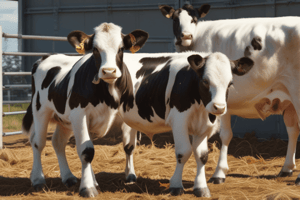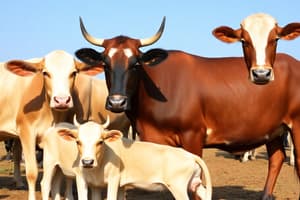Podcast
Questions and Answers
What percentage of beef production is accounted for by suckler herd animals in Ireland?
What percentage of beef production is accounted for by suckler herd animals in Ireland?
25-30%
What is the daily live weight gain (LWG) for Spring Born Suckler calves?
What is the daily live weight gain (LWG) for Spring Born Suckler calves?
0.8-1kg/day
What is the floor space required for weanlings in beef production?
What is the floor space required for weanlings in beef production?
1.4 m²
What is a key difference in growth rates between bulls and steers?
What is a key difference in growth rates between bulls and steers?
What weight do Autumn Born Suckler calves typically have at birth?
What weight do Autumn Born Suckler calves typically have at birth?
How does the EUROP system grade carcass quality?
How does the EUROP system grade carcass quality?
What type of calves are suitable for the continental market, particularly for veal production?
What type of calves are suitable for the continental market, particularly for veal production?
What is the target weight at slaughter for a heifer?
What is the target weight at slaughter for a heifer?
What factors determine carcass quality grading?
What factors determine carcass quality grading?
What impact does castration have on beef production?
What impact does castration have on beef production?
What is the target weight at slaughter for a bull?
What is the target weight at slaughter for a bull?
What is one significant aspect of a notifiable disease?
What is one significant aspect of a notifiable disease?
Define hybrid vigour in the context of breeding.
Define hybrid vigour in the context of breeding.
List two advantages of selecting a stock bull for breeding.
List two advantages of selecting a stock bull for breeding.
What is one of the key factors for achieving a high conception rate in breeding?
What is one of the key factors for achieving a high conception rate in breeding?
Why are biosecurity measures essential in livestock farming?
Why are biosecurity measures essential in livestock farming?
What is the recommended feeding method for calves when introducing whole milk or powdered milk?
What is the recommended feeding method for calves when introducing whole milk or powdered milk?
How should healthy calves be handled upon arrival to the farm?
How should healthy calves be handled upon arrival to the farm?
What is the significance of feeding colostrum to calves?
What is the significance of feeding colostrum to calves?
How should calves be weaned onto a new diet after purchasing them?
How should calves be weaned onto a new diet after purchasing them?
What factors must be taken into account to produce a quality calf in a beef system?
What factors must be taken into account to produce a quality calf in a beef system?
What are the primary physical characteristics that differentiate beef breeds from dairy breeds?
What are the primary physical characteristics that differentiate beef breeds from dairy breeds?
List two categories of beef breeds and provide one example for each.
List two categories of beef breeds and provide one example for each.
Define conformation in the context of beef cattle.
Define conformation in the context of beef cattle.
What are the two main beef production systems?
What are the two main beef production systems?
Flashcards are hidden until you start studying
Study Notes
Common Beef Breeds
- Beef breeds classify into Continental and British categories.
- Notable Continental breeds: Charolais, Limousin, Simmental, Blonde d'Aquitaine.
- Prominent British breeds: Hereford, Aberdeen Angus, Shorthorn, Sussex.
- Each breed possesses unique characteristics affecting growth, meat quality, and hardiness.
Beef in Ireland
- Beef production in Ireland heavily relies on dairy cattle.
- Suckler herds contribute significantly, accounting for 25-30% of total production.
- Friesen calves are particularly suited for the continental veal market.
Beef Cattle Characteristics
- Dairy breeds possess narrow shoulders and hindquarters; beef breeds are wider and meaty.
- Beef cattle have shorter, broader heads and level, fleshed backs.
- Limb structure differs: dairy with strong yet sleek legs; beef with wide and deep legs.
Conformation
- Conformation refers to the physical shape and muscle distribution in cattle.
- Well-conformed animals lead to higher meat quality.
Beef Production Systems
- Cattle are typically slaughtered at 12 to 30 months based on breed and gender.
- Production systems vary in their growth management strategies.
Animal Growth & Development
- Bulls display the fastest growth rates but may exhibit aggressive behavior.
- Steers, being castrated males, have more regulated growth due to lack of testosterone.
Grading Carcase Quality
- EUROP grading system evaluates carcass length, hindquarter shape, fat percentage, and meat content.
- Each carcass is rated from E (best) to P (worst) based on quality metrics.
- Target weights at slaughter are 750kg for bulls, 550kg for steers, and 450kg for heifers.
Beef Production Systems in Ireland
- Irish beef production is mostly from dairy herds.
- Fattening space requirements per animal: 1.4 m² for weanlings and 2.0 m² for fattening cattle.
The Beef Production Year
- Spring calving leads to different management practices compared to autumn calving.
- Key management activities include feeding, health monitoring, and housing adjustments throughout the year.
Two Year Calf to Beef System
- Spring-born sucklers have a birth weight of 40-50kg, with a daily live weight gain (DLWG) of 0.8-1kg.
- Autumn-born sucklers weigh about 45kg at birth, with a DLWG of 1-1.2kg.
Calf Management
- Proper handling and gradual weaning are crucial when purchasing calves from dairy herds.
- Feeding colostrum and ensuring access to clean water and nutritious feed after weaning is essential.
Diseases in Cattle
- Cattle diseases can be viral, leading to weight loss, diarrhea, and other severe symptoms.
- Vaccination is a key preventive measure against infectious diseases.
- Notifiable diseases must be reported to agriculture authorities.
Biosecurity Measures
- Implement robust measures to prevent disease transmission within herds.
Selection of Female Breeding Stock
- Key factors in selecting breeding females include genetic stability, health history, and performance records.
Hybrid Vigour
- Hybrids exhibit enhanced traits such as growth rate and fertility compared to purebred counterparts.
Breeding Systems
- Options include stock bulls and artificial insemination (AI), each with distinct advantages and disadvantages.
- Achieving high conception rates is influenced by careful selection and management practices.
Breeding Programmes
- Effective breeding programs are designed to enhance genetic progress and overall herd health.
Studying That Suits You
Use AI to generate personalized quizzes and flashcards to suit your learning preferences.




